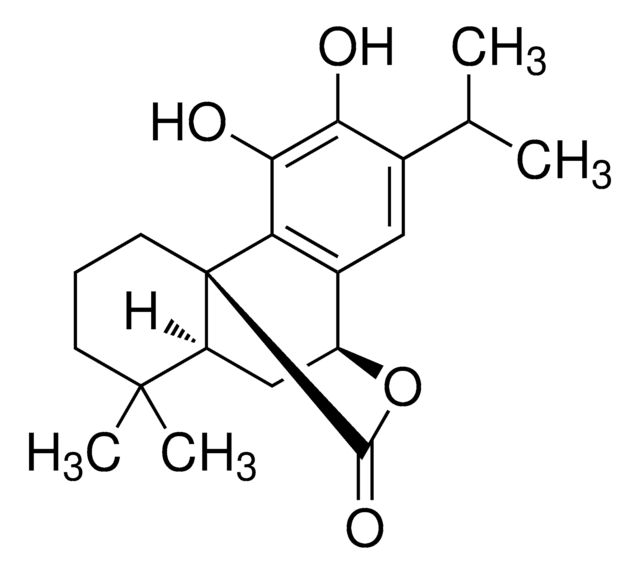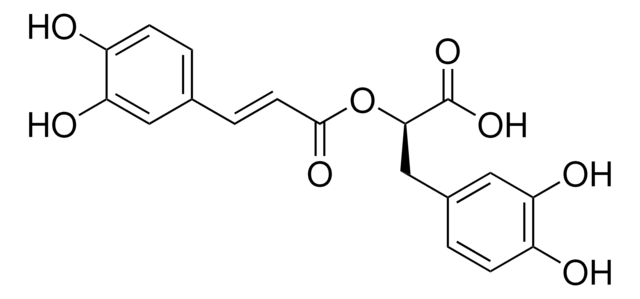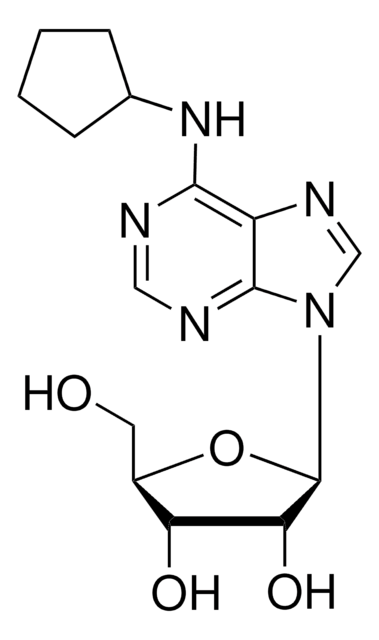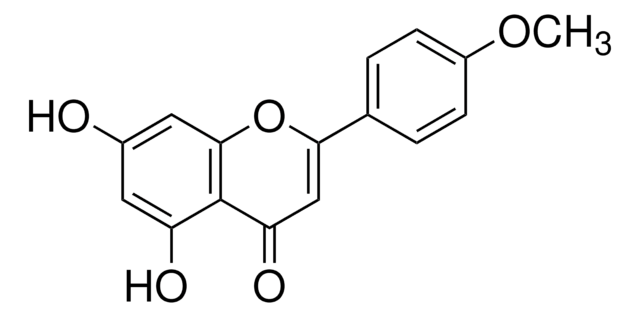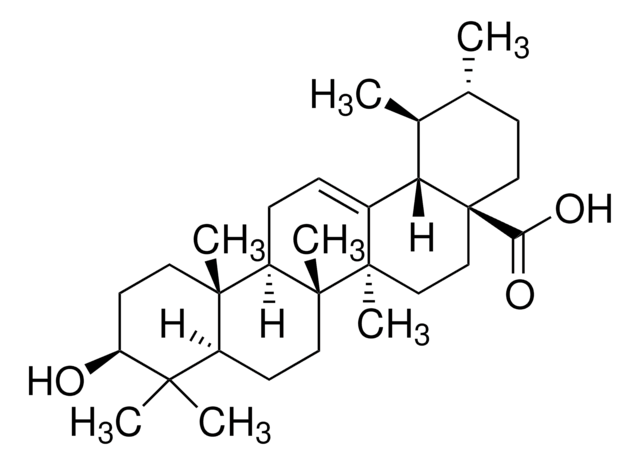すべての画像(1)
About This Item
実験式(ヒル表記法):
C20H26O4
CAS番号:
分子量:
330.42
MDL番号:
UNSPSCコード:
12352100
PubChem Substance ID:
NACRES:
NA.25
おすすめの製品
由来生物
Rosemarinus officinalis L.
品質水準
フォーム
powder
アプリケーション
metabolomics
vitamins, nutraceuticals, and natural products
輸送温度
dry ice
保管温度
−20°C
SMILES記法
CC(C)c1cc2[C@@H]3C[C@H]4C(C)(C)CCC[C@]4(C(=O)O3)c2c(O)c1O
InChI
1S/C20H26O4/c1-10(2)11-8-12-13-9-14-19(3,4)6-5-7-20(14,18(23)24-13)15(12)17(22)16(11)21/h8,10,13-14,21-22H,5-7,9H2,1-4H3/t13-,14-,20+/m0/s1
InChI Key
XUSYGBPHQBWGAD-PJSUUKDQSA-N
類似した製品をお探しですか? 訪問 製品比較ガイド
詳細
Carnosol (CAR) is an ortho-diphenolic diterpene, extracted from the Mediterranean dietary herb Rosmarinus officinalis L. (rosemary). It was first isolated from the Salvia carnosa (Sage) plant. Carnosol is also a pro-electrophilic molecule.
アプリケーション
Carnosol has been used as an anti-cancer agent:
- to test its anti-cancer and anti-proliferative activities on cancer stem-like cells (CSCs) and Glioblastoma multiforme (GBM) cells
- to inspect its anti-carcinogenic effects on nineteen genes involved in up-and down-regulation of different genetic carcinogenesis pathways and on HeLa cells in human cervical cancer model
- as a reference standard to identify and quantify the metabolites of rosemary extract using liquid chromatography coupled to tandem mass spectrometry (LC/ESI-MS/MS)
生物化学的/生理学的作用
Carnosol together with carnosic acid (CA) accounts for 90% of the antioxidant activity of rosemary leaves. It exerts neuroprotective properties and protects against neuroinflammation, and oxidative stress-induced brain damage under chronic stress conditions. Carnosol is a strong chemo-therapeutic agent studied for several types of cancer like breast, leukemia, skin, prostate, and colon. It is also an antimicrobial agent.
A phenolic diterpene with antioxidant and anticarcinogenic activities.
シグナルワード
Warning
危険有害性情報
危険有害性の分類
Skin Sens. 1
保管分類コード
11 - Combustible Solids
WGK
WGK 3
引火点(°F)
Not applicable
引火点(℃)
Not applicable
適用法令
試験研究用途を考慮した関連法令を主に挙げております。化学物質以外については、一部の情報のみ提供しています。 製品を安全かつ合法的に使用することは、使用者の義務です。最新情報により修正される場合があります。WEBの反映には時間を要することがあるため、適宜SDSをご参照ください。
Jan Code
C9617-BULK:
C9617-VAR:
C9617-5MG:
最新バージョンのいずれかを選択してください:
試験成績書(COA)
Lot/Batch Number
この製品を見ている人はこちらもチェック
Marcos Roberto de Oliveira
Molecular neurobiology, 53(9), 6155-6168 (2016-11-01)
Carnosic acid (CA) and carnosol are the major diterpenes found in Rosmarinus officinalis (rosemary), a culinary spice. CA and carnosol account for over 90 % of its anti-oxidant activity in rosemary leaves. The diterpenes exert anti-oxidant, anti-inflammatory, and anti-carcinogenic activities, and
The anticancer molecular mechanism of Carnosol in human cervical cancer cells: An in vitro study
Hafidha RR and Abdulamirb AS
Asia-Pacific Journal of Molecular Biology and Biotechnology, 88-98 (2020)
Lucia Cattaneo et al.
PloS one, 10(7), e0132439-e0132439 (2015-07-16)
Rosemary (Rosmarinus officinalis L.) has been used since ancient times in traditional medicine, while nowadays various rosemary formulations are increasingly exploited by alternative medicine to cure or prevent a wide range of health disorders. Rosemary's bioproperties have prompted scientific investigation
Saeed Samarghandian et al.
BMC complementary and alternative medicine, 17(1), 249-249 (2017-05-06)
Oxidative stress through chronic stress destroys the brain function. There are many documents have shown that carnosol may have a therapeutic effect versus free radical induced diseases. The current research focused the protective effect of carnosol against the brain injury
Marvin J Núñez et al.
Phytochemistry, 72(4-5), 385-390 (2011-02-15)
Two ent-rosane- (cuzcol, 1 and 6-dehydroxycuzcol, 2) and a abietatriene- (salvadoriol, 3) type diterpenoids have been isolated from Maytenus cuzcoina and Crossopetalum uragoga, respectively, along with five known diterpene compounds (4-8). Their stereostructures have been elucidated on the basis of
ライフサイエンス、有機合成、材料科学、クロマトグラフィー、分析など、あらゆる分野の研究に経験のあるメンバーがおります。.
製品に関するお問い合わせはこちら(テクニカルサービス)